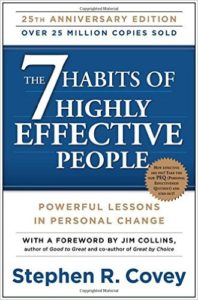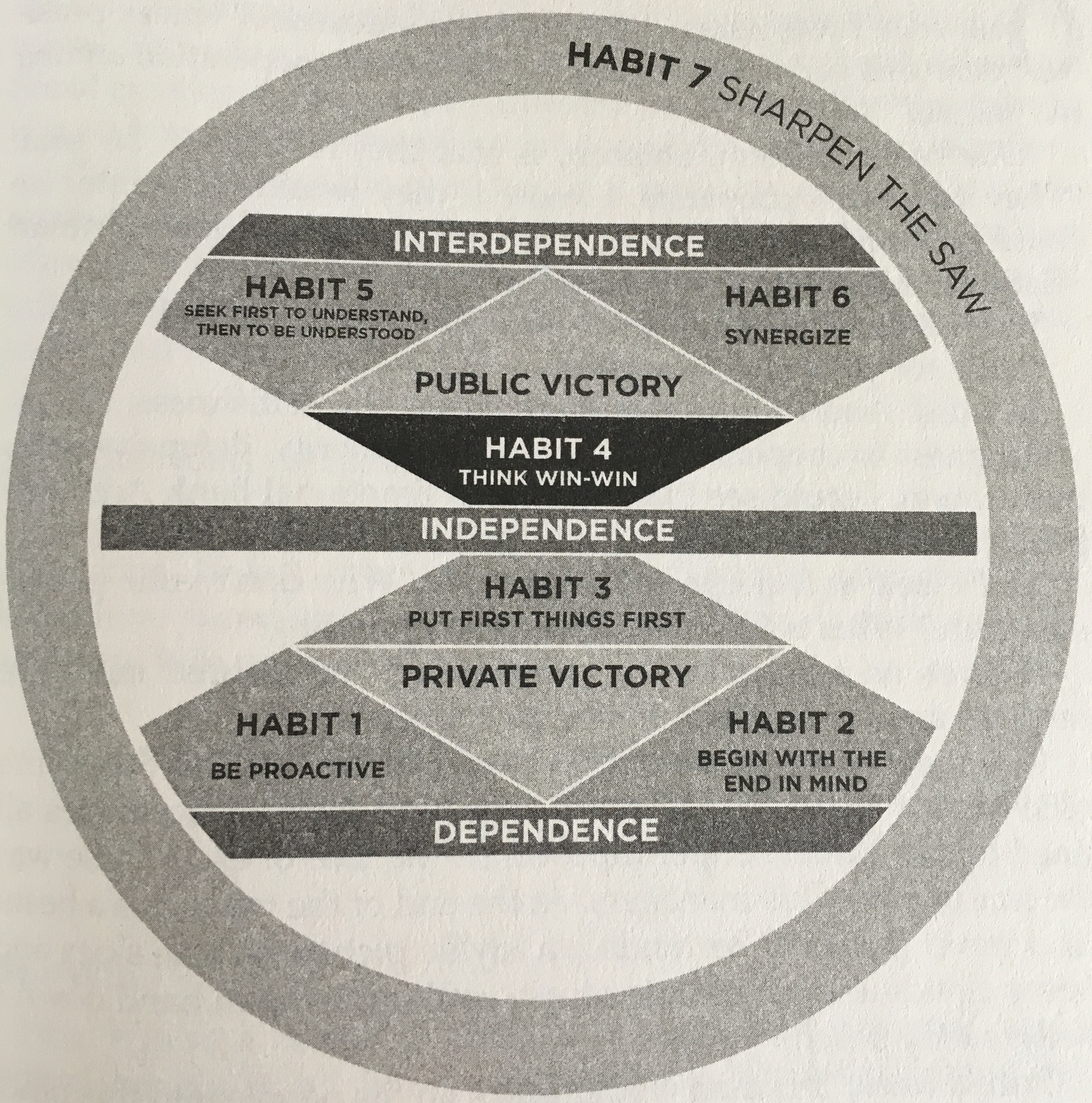To continue the part one on private victory, the latter half of this book focuses on paradigms of interdependence covering the second set of three habits for public victory followed by the 7th habit of sharpen the saw. However, it is important to note that private victory precedes public victory, self-mastery and self-discipline are the foundation of good relationships with others. All seven habits are illustrated together in the figure below cited from the book.
I like the definition of Emotional Bank Account in the book, a metaphor describing the amount of trust that’s been built up in a relationship, the feeling of safeness you have with another human being. The author also suggests six major deposits to build the Emotional Bank Account:
- Understanding the individual
- Attending to the little things
- Keeping commitments
- Clarifying expectations
- Showing personal integrity
- Apologize sincerely when you make a withdrawal.
Dag Hammarskjold, past Secretary-General of the United Nations, said “It is more noble to give yourself completely to one individual than to labor diligently for the salvation of the masses.” Most of us would be able to recall occasions that manifest this statement. We’d rather labor for any purpose at any length for any other people rather than handling with the one particular issue because of the fear of a potential conflict or other imagined consequences. In other words, being coward in one tiny area despite being heroic in many others. Creating the unity necessary to run an effective business or a family or a marriage requires great personal strength and courage. No amount of technical administrative skill in laboring for the masses can make up for lack of nobility of personal character in developing relationships. It is at a very essential, one-on-one level that we live the primary laws of love and life.
The fourth habit is to think win-win. Anything less than Win/Win in an interdependent reality is a poor second best that will have impact in the long-term relationship. The cost of that impact needs to be carefully considered. If you can’t reach a true Win/Win, you are very often better off to go for No Deal. This not only applies to the business world but also the family relationships. Win/Win or No Deal provides tremendous emotional freedom in the family relationship. If family members can’t agree on a video that everyone will enjoy, they can simply decide to do something else – No Deal – rather than having some enjoy the evening at the expense of others.
I particularly like the Character section that describes character as the foundation of Win/Win and the three character traits essential to the Win/Win paradigm: integrity, maturity and abundance mentality. Maturity is the balance between courage and consideration. It is defined by Professor Hrand Saxenian of Harvard Business School as “the ability to express one’s own feelings and convictions balanced with consideration for the thoughts and feelings of others”. Some examples include the ego strength/empathy balance, the self confidence/respect for others balance, the concern for people/concern for tasks balance.
The fifth habit is to seek first to understand, then to be understood. The author suggests we practice the highest form of listening, empathic listening. The four lower levels are ignoring, pretending, selective listening, attentive listening. Empathic listening is to listen with intent to understand and to get inside another person’s frame of reference. You look out through it, you see the world the way they see the world, you understand their paradigm, you understand how they feel. Before the problems come up, before you try to evaluate and prescribe, before you try to present your own ideas – seek to understand. It’s a powerful habit of effective interdependence. When we really, deeply understand each other, we open the door to creative solutions and third alternatives. Our differences are no longer stumbling blocks to communication and progress. Instead, they become the stepping stones to synergy.
The sixth habit is to synergize. Synergy means that the whole is greater than the sum of its parts. It means that the relationship which the parts have to each other is a part in and of itself. It is not only a part, but the most catalytic, the most empowering, the most unifying and the most exciting part.
The last habit is to sharpen the saw. Habit 7 is preserving and enhancing the greatest asset you have – you. It is renewing the four dimensions of your nature – physical (exercise, nutrition, stress management), spiritual (value clarification & commitment, study & meditation), mental (reading, visualising, planning, writing) and social/emotional (service, empathy, synergy, intrinsic security). “Sharpen the saw” means expressing all four motivations. It means exercising all four dimensions of our nature, regularly and consistently in wise and balanced ways.
Through reading this book, I gained more awareness of not only the potentials for improvements on my part, but also the guidance of how-to-improve. Its impact on me can only be measured in a much longer timeframe than the time spent on reading this book for the first time. It is one of those books that one would like to flip through from time to time.
To conclude this article with a quote from Edwin Markham: We have committed the Golden Rule to memory, let us now commit it to life.

